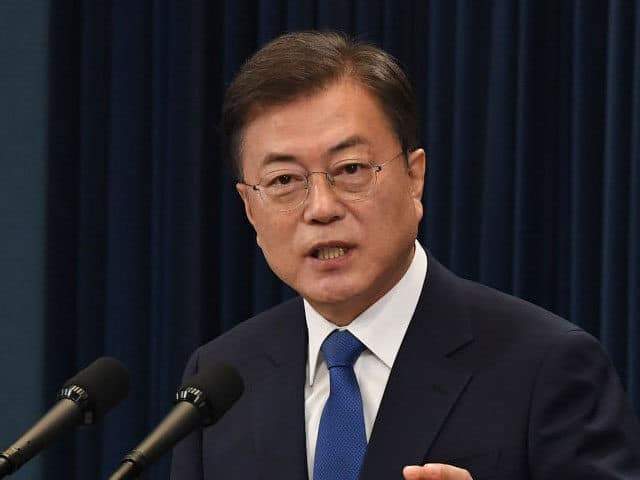Leftist South Korean President Urges Biden to Follow Trump’s Lead on North Korea

Leftist South Korean President Moon Jae-in told reporters Monday that he hoped the administration of President-elect Joe Biden would continue the work President Donald Trump began in meeting with North Korean dictator Kim Jong-un.
Trump met with Kim twice — the first American head of state to meet a North Korean communist dictator — in Singapore in 2018 and in Hanoi, Vietnam, a year later. The first summit resulted in the signing of what is known as the “Singapore Declaration,” a joint statement in which both sides agreed to take unspecified measures to diffuse tensions. North Korea also agreed to return the remains of American soldiers killed during the active hostilities of the Korean War, which began in 1950 and technically continues today.
The Hanoi summit ended abruptly as Trump walked out on Kim, claiming his negotiators were too intransigent on Pyongyang’s illegal nuclear weapons program.
Moon has met with Kim on three occasions, all in 2018. In the last summit in September of that year, Moon visited Pyongyang, an unprecedented move, and received a personal tour of Mount Paektu, a volcano historically symbolic to the Korean people, from Kim himself.
In his remarks Monday, Moon appeared to lament that Trump’s meetings with Kim had not continued and hoped Biden would return to Trump’s original policy, although North Korea has referred to the former vice president as a “rabid dog” who “must be beaten to death with a stick as quickly as possible.”
“The inauguration of the new Biden administration could be the impetus for a fresh start for both North-U.S. and inter-Korean dialogue,” Moon told reporters, according to Korea’s JoongAng Ilbo. He referred specifically to the Singapore Declaration as “a very important declaration in terms of denuclearization and establishing peace on the Korean Peninsula” and reportedly hoped Biden would expand upon its signing.
The Singapore Declaration, signed in June 2018, committed Trump and Kim to “establish new U.S. — DPRK relations in accordance with the desire of the population of the peoples of the two countries for peace and prosperity.” It also required the parties to “join their efforts” to build a “peace regime” in Korea and required North Korea to “work toward complete denuclearization of the Korean Peninsula.”
The two parties never added any specific requirements to their general call for peace. The issue of denuclearization also stalled because North Korea insisted on defining “denuclearization” not as an end to North Korea’s illegal nuclear weapons program, but as the removal of the U.S. military presence in Korea entirely, as America is a nuclear power. Trump administration officials later admitted they had never managed to draft a mutually agreed-upon definition of “denuclearization.”
North Korea has conducted six nuclear weapons tests. Four of them occurred under President Barack Obama — and Vice President Joe Biden — when Washington took a more conciliatory approach towards North Korea. The sixth and last nuclear weapons test occurred under Trump in 2017. The Trump administration managed to convince the U.N. Security Council, including North Korea’s top ally China, to impose unprecedentedly strict sanctions on North Korea, resulting in an end to the nuclear tests.
In early January, at the opening of the congress of Kim Jong-un’s Workers’ Party of Korea (WPK), the dictator acknowledged that attempts at building North Korea’s economy in the past five years had been a catastrophic failure, resulting in the party falling short in “almost all sectors” of its goals.
During the 2020 presidential campaign, Biden falsely claimed that Trump had weakened sanctions on North Korea.
During his remarks Monday, Moon also suggested that Biden should consider a proposal to formally end the Korean War. While no active hostilities have occurred since 1953, the warring parties — South Korea and America on one side, China and North Korea on the other — never signed a peace treaty and neither side surrendered.
Moon also spoke glowingly of Biden, stating that he was “well-versed in inter-Korean affairs to the point where he has supported President Kim Dae-jung’s Sunshine Policy in the past.”
South Korean President Kim (no relation) established the “Sunshine Policy,” which sought to develop friendly ties with North Korea despite the fact that the Koreas remain technically at war, during his tenure in the late 1990s and early 2000s. The result of the policy was several summits between Kim and then-North Korean dictator Kim Jong-il, North Korea’s development of an illegal nuclear weapons program, and the South Korean taxpayer footing a bill of hundreds of millions of dollars to the North.
“I believe our government holds in common various principles with the new Biden administration, such as multilateralism and alliance values, and that we are on the same wavelength in some aspects,” Moon said Monday.
Moon has publicly supported Biden since his election and was the first world leader to speak to the president-elect after his win in November. The South Korean leader said at the time that he was seeking to meet Biden in person “at an early date after Biden’s inauguration,” his office said.
Photo: Kim Min-Hee-Pool/Getty Images
Link: https://www.breitbart.com/asia/2021/01/18/leftist-south-korean-president-urges-biden-follow-trumps-lead-north-korea/











